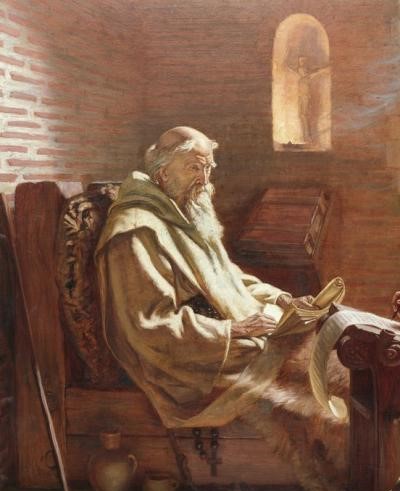
Saint of the Day for 25 May: St. Bede the Venerable
St. Bede the Venerable: Life, Works and Influence of the Doctor of the Church
Name
St. Bede the Venerable
Title
Priest and Doctor of the Church
Birth
672, Scotland
Death
May 25, 735, Jarrow, England
Recurrence
25 May
Prayer
O Lord, who illustrates your Church with the erudition of your blessed confessor and doctor Bede, grant propitious to your servants to be always enlightened by his wisdom and helped by his merits.
Protector
of scholars
Roman Martyrology
In Jarrow, England, Venerable St. Bede, Priest, Confessor and Doctor of the Church, celebrated for holiness and doctrine.
The Saint and Mission
St. Bede the Venerable dedicated his life to the mission of spreading Christian knowledge and faith through writing and teaching. Born in 673 in the kingdom of Northumbria, Bede spent most of his life in the monastery of Jarrow, where he developed a deep passion for theology, history and the sciences. His mission was clear: to educate monks and lay people, preserve history and promote the understanding of Scripture. Bede is perhaps best known for his work “Historia Ecclesiastica Gentis Anglorum” (Ecclesiastical History of the English People), an invaluable source for the history of England and the Church. In this work, Bede not only recorded historical events but sought to interpret the theological significance of events, showing how divine providence worked through human history. His ability to unite faith and reason, to see the world as a reflection of the divine order, was at the heart of his mission. Bede worked tirelessly, studying, writing and teaching, to ensure that future generations would have access to the wisdom and knowledge needed to understand and live the Christian faith. His life is an example of intellectual and spiritual dedication, showing how the pursuit of truth and knowledge can be an act of devotion and service to God.
The Saint and Mercy
St. Bede the Venerable expressed mercy through his tireless commitment to the transmission of knowledge and faith. His life in the monastery of Jarrow was devoted not only to study but also to the spiritual care of others. Writing and teaching, Bede showed deep compassion for the souls of his contemporaries, desiring that they might grow in their understanding of the Gospel and find comfort in the Christian faith. His works, full of wisdom and piety, were intended to guide and inspire, offering a sense of hope and direction. His “Historia Ecclesiastica Gentis Anglorum” is not just a historical account, but an act of intellectual and spiritual mercy, seeking to show God’s presence in history and to strengthen the faith of the people. His attention to detail and his desire to preserve historical truth reflect a deep care for the spiritual welfare of future generations. Bede also embodied mercy in his humility and willingness to help his fellow monks and lay people. His life and works are a lasting witness to how knowledge and mercy can work together to build a stronger and more enlightened community of faith.
Hagiography
Bede means a man who prays. He was born the year 672 on the borders of Scotland. When he was seven years old, his parents entrusted him to St. Benedict Biscopius, who, admiring the child’s fine dispositions, favored him and formed him in piety and science. At the age of 12 he was clothed in the Benedictine habit. In 691 he was ordained deacon and a few years later priest…
